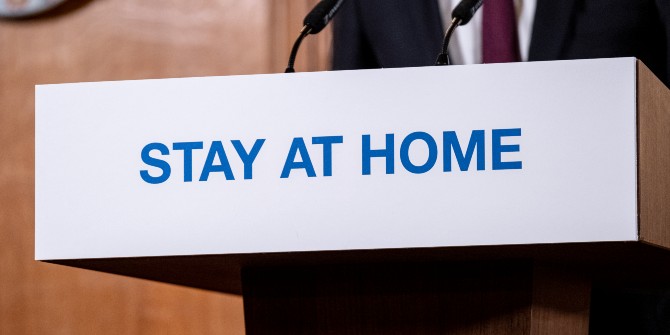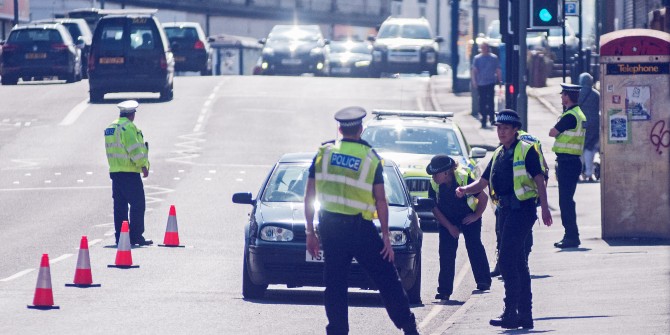Joelle Grogan (Middlesex University) explains the law and governance put in place by the UK government to try to reduce the spread of COVID, finding that it was characterised by executive dominance, uncertainty, and inconsistency.
In its response to COVID-19, UK governance has been characterised by political hyperbole from the Westminster executive coupled with a lax if not lackadaisical response, succeeded by sudden U-turn policymaking and severely restrictive measures. The hypertrophied executive dominance of action coupled with the lack of parliamentary oversight, as well as uncertainty as to the distinctions between law, guidance and advice, have plagued the COVID response in the UK.
While the government rhetorically “declared war” on the virus, it did not, however, call upon ‘state of emergency’ provisions under the Civil Contingencies Act 2004. While providing for far more wide-reaching centralised executive powers, the 2004 Act also contains explicit provisions for judicial review and additional parliamentary oversight, as well as a 30-day sunset clause for regulations under its provisions. Where this Act was not relied upon, targeted legislation was instead needed to introduce the powers necessary to address the pandemic emergency, and to account for the fact that health is a devolved competence.
Described as a “manifestation of excessive executive dominance” for its trifecta of wide delegated powers, Henry VIII powers (where government ministers can repeal or amend statutory law) and lack of parliamentary scrutiny, the Coronavirus Bill, at 359 pages, was published on 19 March 2020, and fast-tracked through Parliament with only one day of debate to receive royal assent four parliamentary days later on 25 March.
The Westminster government defended plans to jail any person found to have lied about their recent travel history for up to ten years
The Coronavirus Act 2020 provides for a myriad of measures including the reduction of certain administrative checks relating to the certification of deaths, and the detention and treatment of mental health patients, as well as the introduction of a number of new offences. The Act notably did not give specific lockdown powers. The secretary of state for health had at that point already introduced lockdown through secondary legislation under the Public Health (Control of Disease) Act 1984, as amended in 2008 following the SARS outbreak. The Coronavirus Act did, however, extend powers to public authorities across the UK to quarantine those who have tested positive (or inconclusive) as well as to test those suspected of having the disease.
The Act has a sunset clause (or an ‘expiry date’) of two years, with the option for parliament-approved six-month extensions beyond that point. This was initially met with strong opposition to such a long period. It can be contrasted with the Scottish equivalent, the Coronavirus (Scotland) Act 2020, which was drafted to include only a six-month sunset clause with the option for renewal by the Scottish Parliament. One concession accepted by government in the form of an amendment to the Coronavirus Act 2020, was a six-month parliamentary review in the form of a debate on the date of the expiry of the Act. This follows two-month status reports, and a debate on non-devolved matters in the Act in both Houses of Parliament after a year.
A welcome aspect of the Coronavirus Act was its self-containment, serving as a model for other pandemic legislation in this regard. The Act’s provisions could only be interpreted as relating to the COVID-19 pandemic. Upon expiry, its effects – even where it has modified other primary acts – disappear. In distinction to concerns in other states as to permanent changes to the law following the introduction of emergency powers, the Coronavirus Act 2020 was not expected, or designed, to create permanent change. However, a majority and the most restrictive of statutory instruments governing UK pandemic management were adopted under the Public Health (Control of Disease) Act 1984 – not the Coronavirus Act – the vires of which was questioned by critics, though the courts declined to review it.

Between March 2020 and August 2021, over 480 statutory instruments were introduced with little or no parliamentary scrutiny, as 71 percent were subject to the ‘made negative’ procedure whereby the regulation can be laid before Parliament after it has been signed into law by a minister. Nearly 44 percent of these regulations came into effect before they were laid before parliament, in breach of parliamentary convention to allow for scrutiny or objection. Such regulations have included powers delegated to police forces to enter private premises day or night, and to issue fines of up to £10,000 for breach of self-isolation rules – the latter rule coming into force within hours of being introduced. Deeply concerning from the perspective of legality, at some points orders had no legislative underpinning: on 30 July 2020 the secretary of state for health announced a ban on different households meeting indoors from midnight, though this did not have legislative effect until 5 August.
Nearly a quarter of COVID-related instruments were subject to the urgent procedure under the Public Health (Control of Disease) Act 1984, which was often not justified by reason of a lack of time. As highlighted by the Hansard Society, in one such instance, mandatory face coverings had been policy-trialled for weeks, before being introduced under the urgent procedure ostensibly due to the lack of time to properly consider such a measure.
The International Travel Regulations were amended over 50 times before finally being revoked
The lack of oversight coupled with rapid introduction, amendment and revocation correlated with frequent errors in the regulations, and compounded concerns over legal uncertainty and potentially unlawful exercises of power. The International Travel Regulations were amended over 50 times before finally being revoked; the single replacement regulation began itself to be subject to a number of amendments within days. Such rapid change challenges the capacity of the public and public authorities, especially those charged with enforcement, to follow rules and to adapt.
A connected criticism of government action was the difficulty of distinguishing between government advice, guidance and the law. Such uncertainty creates problematic issues for the rule of law, where police forces may interpret and enforce ‘guidance-as-law’, and in doing so unlawfully act beyond their powers. This was all the more heightened where the government announced measures in press conferences rather than in Parliament, justified their decision-making in articles behind newspaper paywalls, and (at least rhetorically) adopted draconian penalties for breach of COVID measures which may not have had a sound legal basis. For example, the Westminster government defended plans to jail any person found to have lied about their recent travel history for up to ten years (by scale comparison, causing death by dangerous driving holds a maximum sentence of five years), and stated that Parliament would not be given a vote on such a new offence.
Where consent could be evidenced to be more effective than coercion, and public trust in the decision-making of governments is key to the most effective responses to pandemic management, modes of governance characterised by executive dominance, uncertainty, inconsistency, and occasionally even by senior government officials not abiding by their own rules, only serves to undermine any collective social and good faith efforts to cope with crisis and emergency.
This post represents the views of the author and not those of the COVID-19 blog, nor LSE. It is an edited extract from ‘(Un)Governing: COVID-19 Response in the UK’ Forthcoming in J Grogan and A Donald (eds.), Routledge Handbook of Law and the COVID-19 Pandemic (Routledge 2022).





